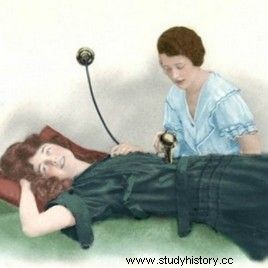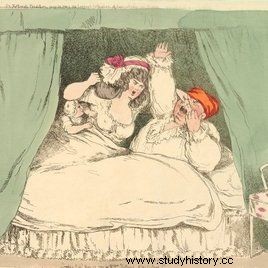Deadly contraception. Fourteen-year-old boys who have sex regularly. And the degeneration of the brain as a result of daily amorous games. These are just a few of the surprising facts about the erotic life of our great-grandparents. And ideas about him.
As always, all TOP10 items are based on the articles we publish. This time - devoted to the erotic life of our great-grandparents. You can find even more texts on this subject in the category devoted to World War I and the interwar period.
It's good to know that…
 | 10. | Even at the beginning of the last century, doctors claimed that looking for a change in love life leads to the destruction of the body. There were even those who likened sex in any position other than missionary to masturbation - supposedly the worst plague to plague mankind. It took a good 30 years for this view to begin to fade away (read more on this) . |
 | 9. | In the days of our great-grandparents, enjoying French love by a woman was considered an outright perversion. If a woman enjoyed oral sex, it showed either she was perverted, or she was unable to engage in the sexual act (read more about this). |
 | 8. | Electric vibrators initially had nothing to do with sex toys. The invention of Joseph Mortimer Granville in the first years was used only as devices for the most ordinary massage. Polish doctors even warned that special care should be taken when massaging the inner part of the thighs with a vibrator to avoid excessive irritation of the reproductive parts (read more about this). |
 | 7. | Pre-war female contraception was deadly. Various mercury preparations such as sublimate, salicylic acid, formic acid or lysol were used to prevent pregnancy. The latter was also used for ... cleaning toilets (read more about this) . |
 | 6. | There were a number of bizarre ways to check if the heart's chosen one is a virgin. The fact that a woman had been behind her for the first time was allegedly evidenced by a thickening of the neck or a change in the tone of her voice which became thicker, hoarse . The most desperate could also look at ... urine partners. It was claimed that virgins' urine was thinner and transparent, while married women were denser, muddy, giving sediment (read more about this) . |
 | 5. | In the interwar period, propagators of the nascent sexual revolution were vehemently opposed to shared dormitories. The advocates of progress saw them as a relic of disgusting 19th-century customs. In their opinion, modern marriage was based on the constant charm of discovering intimacy. Something they have argued is impossible if the couple are constantly in the same room (read more about this). |
 | 4. | Even just before the outbreak of World War II, specialists strongly advised against having sex every day. Too exuberant erotic life was to lead to tragic consequences. Potential threats included:damage to the nervous system, memory loss, and even brain degeneration (read more on this topic) > . |
 | 3. | In pre-war Poland, the sale of any erotic accessories was strictly prohibited. You could get up to two years in jail for the trade in this type of item. Nevertheless, there was no shortage of willing people, and the assortment offered from under the counter was not much poorer than in today's sex shops (read more on this topic) . |
 | 2. | In the Second Polish Republic, boys underwent sexual initiation much earlier than today . According to research conducted shortly after regaining independence, 75% of respondents experienced their first time before their eighteenth birthday. In turn, as many as 15% of respondents started having sex before their fourteenth birthday. (read more about this). |
 | 1. | At the turn of the 20th century, it was still believed that only men could enjoy sex. Women were denied the right to any kind of erotic gratification. Representatives of the "weaker" sex could count on ... the joy of motherhood (read more on this topic). |
